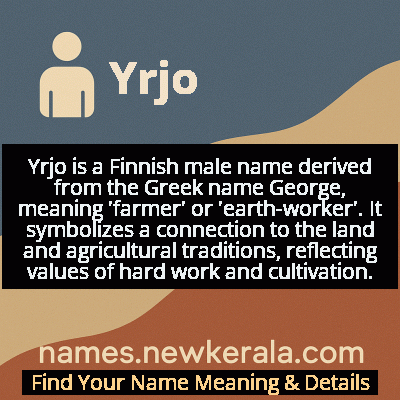Yrjo Name Meaning & Details
Origin, Popularity, Numerology Analysis & Name Meaning of Yrjo
Discover the origin, meaning, and cultural significance of the name YRJO. Delve into its historical roots and explore the lasting impact it has had on communities and traditions.
Name
Yrjo
Gender
Male
Origin
Greek
Lucky Number
5
Meaning of the Name - Yrjo
Yrjo is a Finnish male name derived from the Greek name George, meaning 'farmer' or 'earth-worker'. It symbolizes a connection to the land and agricultural traditions, reflecting values of hard work and cultivation.
Yrjo - Complete Numerology Analysis
Your Numerology Number
Based on Pythagorean Numerology System
Ruling Planet
Mercury
Positive Nature
Adventurous, dynamic, curious, and social.
Negative Traits
Restless, impatient, inconsistent, prone to indulgence.
Lucky Colours
Green, white.
Lucky Days
Wednesday.
Lucky Stones
Emerald.
Harmony Numbers
1, 3, 9.
Best Suited Professions
Sales, marketing, travel, entertainment.
What People Like About You
Versatility, charisma, adventurous spirit.
Famous People Named Yrjo
Yrjö Kallinen
Politician
Finnish Member of Parliament and prominent peace activist
Yrjö Kokko
Author and Physician
Renowned Finnish writer and doctor, known for his nature writing and medical contributions
Yrjö Leino
Politician
Finnish Minister of the Interior and significant political figure
Yrjö Väisälä
Astronomer and Physicist
Discovered numerous asteroids and made significant contributions to optics and meteorology
Name Variations & International Equivalents
Click on blue names to explore their detailed meanings. Gray names with will be available soon.
Cultural & Historical Significance
In Finnish culture, Yrjo represents a bridge between classical European naming traditions and distinct Finnish identity, often chosen to honor both family heritage and national pride. The name appears in various historical records and literary works, contributing to its enduring cultural relevance. During periods of national awakening and identity formation, names like Yrjo helped maintain cultural continuity while adapting international influences to Finnish linguistic patterns. The name's persistence through generations speaks to its deep roots in Finnish society and its ability to convey both individual identity and collective cultural values.
Extended Personality Analysis
Individuals named Yrjo are typically perceived as grounded, practical, and hardworking, reflecting the name's agricultural origins. They often exhibit strong connections to tradition and family values, demonstrating reliability and steadfastness in their personal and professional lives. Yrjos are commonly seen as patient and methodical problem-solvers who approach challenges with careful consideration and persistence. Their personality often combines Finnish sisu (perseverance) with the practical wisdom associated with farming heritage, making them dependable friends and colleagues who value authenticity over superficiality.
Many Yrjos display a quiet confidence and deep respect for nature and traditional ways of life, while also adapting well to modern circumstances through their inherent practicality and resourcefulness. They tend to be observant and thoughtful, preferring to listen carefully before speaking or acting. This contemplative nature often makes them excellent planners and strategists. While they may appear reserved initially, Yrjos typically form deep, lasting relationships based on mutual trust and respect. Their strength lies in their consistency and ability to weather challenges with calm determination rather than dramatic displays of emotion or action.
Modern Usage & Popularity
In contemporary times, Yrjo maintains a traditional and somewhat rare status in Finland, primarily used among families seeking to honor Finnish heritage and cultural roots. While not among the most popular modern Finnish names, it continues to be chosen by parents who value historical significance and cultural continuity. The name has seen a slight resurgence in recent years as part of the broader trend of reviving traditional Finnish names, particularly among educated urban families rediscovering their cultural heritage. Outside Finland, Yrjo remains relatively unknown and is primarily used within Finnish expatriate communities seeking to maintain cultural connections. Its usage reflects a conscious choice to preserve Finnish linguistic and cultural identity in an increasingly globalized world, serving as a marker of specific cultural affiliation rather than following mainstream naming trends.
Symbolic & Spiritual Meanings
Symbolically, Yrjo represents the enduring connection between humanity and the earth, embodying themes of cultivation, growth, and sustenance. The name carries metaphorical significance as a representation of patience, nurturing, and the cyclical nature of life - much like the agricultural processes it originally referenced. It symbolizes the idea that through steady, consistent effort and respect for natural rhythms, one can cultivate not just crops but also relationships, knowledge, and personal character. The name also embodies the Finnish concept of 'sisu' - that special combination of determination, resilience, and courage that enables individuals to overcome challenges through persistent effort rather than sudden bursts of activity. In a broader sense, Yrjo represents the virtue of working in harmony with natural processes and the wisdom that comes from understanding that all meaningful growth requires time, care, and respectful engagement with one's environment.

